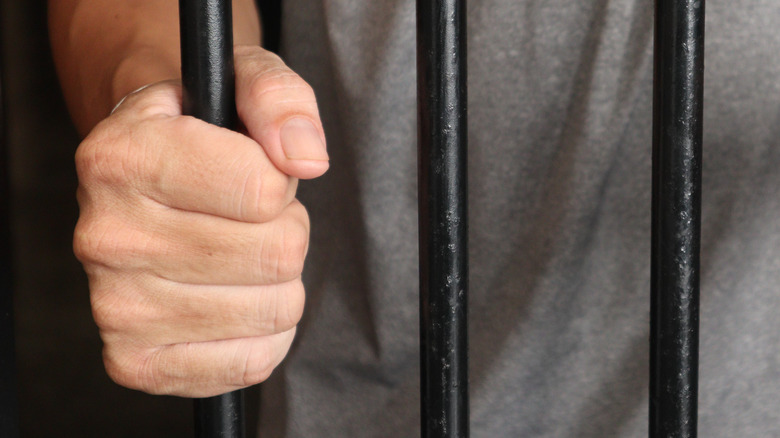This Is The Real Difference Between Murder And Manslaughter
If any of your actions, malicious or otherwise, lead to the death of another human being, you're going to find yourself in some pretty hot water. Human life is tremendously fragile, and so are the rules that apply to preserving it. Murder has been the stuff of popular entertainment for decades upon decades, from Miss Marple to Perry Mason and beyond. Whenever there's a major murder trial sweeping headlines across the world, you hear phrases like "murder in the first degree" or "on charges of manslaughter" floating around, depending on the nature of the crime. Both "murder" and "manslaughter" are pretty harrowing terms that carry heavy ramifications in the event of a conviction, so you should probably avoid ever having to deal with either charge at all costs. While both denote the unfortunate death of an individual (or individuals), there is a significant legal distinction between the two.
According to Lawrina, murder and manslaughter stem from the same fundamental offense: homicide. Homicide is defined as "the killing of a human being when it is caused by another person, whether intentionally or accidentally" (via FindLaw). Other forms of homicide include Legal Homicide, Vehicular Homicide, Euthanasia, and Reckless/Negligent Homicide. What is the true difference between murder and manslaughter? How does the legal system determine which one a person is guilty of? What kind of penalties do they carry? Is one worse than the other? At base level, the death of another person is the common denominator, but the application of intent is what really draws a divide between the two.
What does it really mean when you murder someone?
Murder. It's such an ugly word. It's an even uglier act. While the classification of murder differs from state to state, the rudimentary definition requires that the accused acted maliciously and with explicit intent to harm. That doesn't necessarily mean with intent to kill, however. The unfortunate outcome of death could have happened accidentally, but if the risks of fatal harm were disregarded by the perpetrator, this can constitute murder, as Lawrina reports. For instance, if you take a knife and plunge it into someone's heart with the intent to kill them, it really goes without saying that you are the dictionary definition of a murderer. However, even if you were just trying to harm them severely and they end up dying as a result, this still qualifies as murder.
The former is what we call murder in the first degree, which entails premeditation and a direct deliberation to kill (per Cornell Law School). First degree murder diverts into two categories: premeditated murder (willful intent to kill) and felony murder (accidental death as a result of malicious attacks). On the other hand, second degree murder carries the intent of malice and harm, but the killing itself was unintentional. For instance, if somebody dies as the result of an arson, assault, or some other act of cruel violence (typically void of premeditation), the person responsible could very well be charged and convicted with second degree murder, according to Cornell Law School.
What does it mean when you commit manslaughter?
This is where things get kind of foggy. It may seem like the definitions of manslaughter and second degree murder blend together at times, but there's a fine line. Ergo, sentencing for manslaughter is different. An act is classified as manslaughter when there was no prior intent to kill, though voluntary manslaughter does actually entail willingness (also via FindLaw). However, it's reduced to the classification of manslaughter if the person who committed the act is deemed to have acted as a result of strong provocation from the deceased party. Basically, if someone who is considered mentally sound commits a homicide because of a strong emotional catalyst that any normal person is liable to act on behalf of — infidelity, for instance — the accused can avoid a murder conviction and in turn be convicted of manslaughter in its place, according to Lawrina.
Involuntary manslaughter occurs when there was zero intent to kill, but somebody still dies. Certain rash behaviors that result in the unlawful death of an individual — or criminal negligence — can constitute a case of involuntary manslaughter. You often see this with driving infractions (vehicular manslaughter). If somebody who is unfit to drive a vehicle gets behind the wheel and tragically kills someone as a result, they'll might be charged with involuntary manslaughter. Examples vary, but involuntary manslaughter is generally denoted by criminal negligence or recklessness, as Law Shelf reports. Basically, the person being charged made a senseless mistake that resulted in a fatality.


